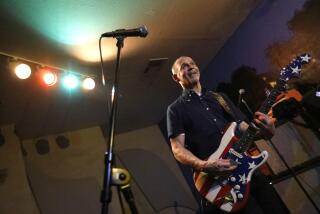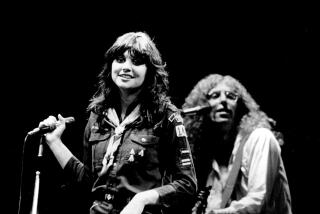Techno-Rocking Kraftwerk Charges Up
- Share via
Kraftwerk hasn’t released an album of original material in close to a decade, its live shows are few and far between and none of the four members has gone on to release any recent solo material of note. So how is it that the German quartet not only sold out the Hollywood Palladium on Monday but managed to turn this ultra-rare L.A. appearance--its first in close to 15 years--into one of the can’t-miss musical events of the year?
At a time when electronic textures have infiltrated the pop landscape like never before, Kraft-werk’s manifold innovations in the realm of circuit-driven music loom large. The group, which released its first album in 1971, is to contemporary synth-derived rock what the Velvet Underground is to punk and alternative rock--the band that made it all possible.
During Kraftwerk’s expansive two-hour performance at the Palladium, one could pinpoint the musical seeds that later germinated into the ‘80s New Romantic synth-pop movement that spawned bands such as Spandau Ballet and Depeche Mode, trip-hop, house music and contemporary techno. Even hip-hop owes a considerable debt to this Teutonic foursome--rap pioneer Afrika Bambaataa sampled the band’s “Trans-Europe Express” for his seminal 1982 song “Planet Rock.”
But it’s the recent surge of techno, combined with the revival of the “Krautrock” movement that Kraftwerk spearheaded in the ‘70s, that drew all those fans to the Palladium. That, and the fact that the band’s inscrutably chilly yet strangely riveting stage persona is as much a part of its appeal as the music itself.
Onstage at the Palladium, the members of Kraftwerk were elegantly sleek futurists. Ralf Hutter, Florian Schneider and new recruits Fritz Hilpert and Henning Schmitz--dressed in matching black vinyl outfits--stood side by side like high-tech assembly workers and played in front of an intricate matrix of electronic equipment and lights that resembled one of NASA’s mission control panels. Four screens above the band flashed constructivist tableaux, whimsical computer animation and video collages in perfect sync with the music.
It was all an appropriate visual analogue to Kraftwerk’s sound, which vacillated from pristine and mechanical to serene and meditative. Perhaps the most remarkable aspect of Kraftwerk’s performance was the way it created countless musical variations on its minimalist bleep-ology. The band moved effortlessly from the playful, childlike charm of “Tour de France” and the austere beauty of “Computer World” to the ominous grind of “Man-Machine,” the closest thing to a personal manifesto the band has ever recorded.
Purists may chafe at the thought, but Kraftwerk proved on Monday that it was really the first great industrial synth-pop dance band. Masters of the robotic jam, the band would start with deceptively simple melodic motifs and either surge forward in a headlong rush (thereby coming very close to the metronomic thump of house music) or downshift into the orderly lock-step rhythmic patterns of songs such as “Trans-Europe Express” and the band’s most famous song, “Autobahn.” Regardless of the tempo, the Palladium crowd responded with healthy doses of frenetic dancing--that is, when it wasn’t ogling the band’s eye-popping visuals.
Though Kraftwerk is one of the few bands that can spend an evening tinkering around with sequencers and still command attention, its coolly functional approach began to grow tiresome about midway though its set. Fortunately, the quartet had a couple of surprises in store for its three-song encore, particularly during “We Are the Robots,” which featured four animatronic facsimiles of the band members slowly gyrating to the seamless motorik beat. For a band whose relationship with technology verges on the symbiotic, it was the logical conclusion to a spellbinding set.
More to Read
The biggest entertainment stories
Get our big stories about Hollywood, film, television, music, arts, culture and more right in your inbox as soon as they publish.
You may occasionally receive promotional content from the Los Angeles Times.










